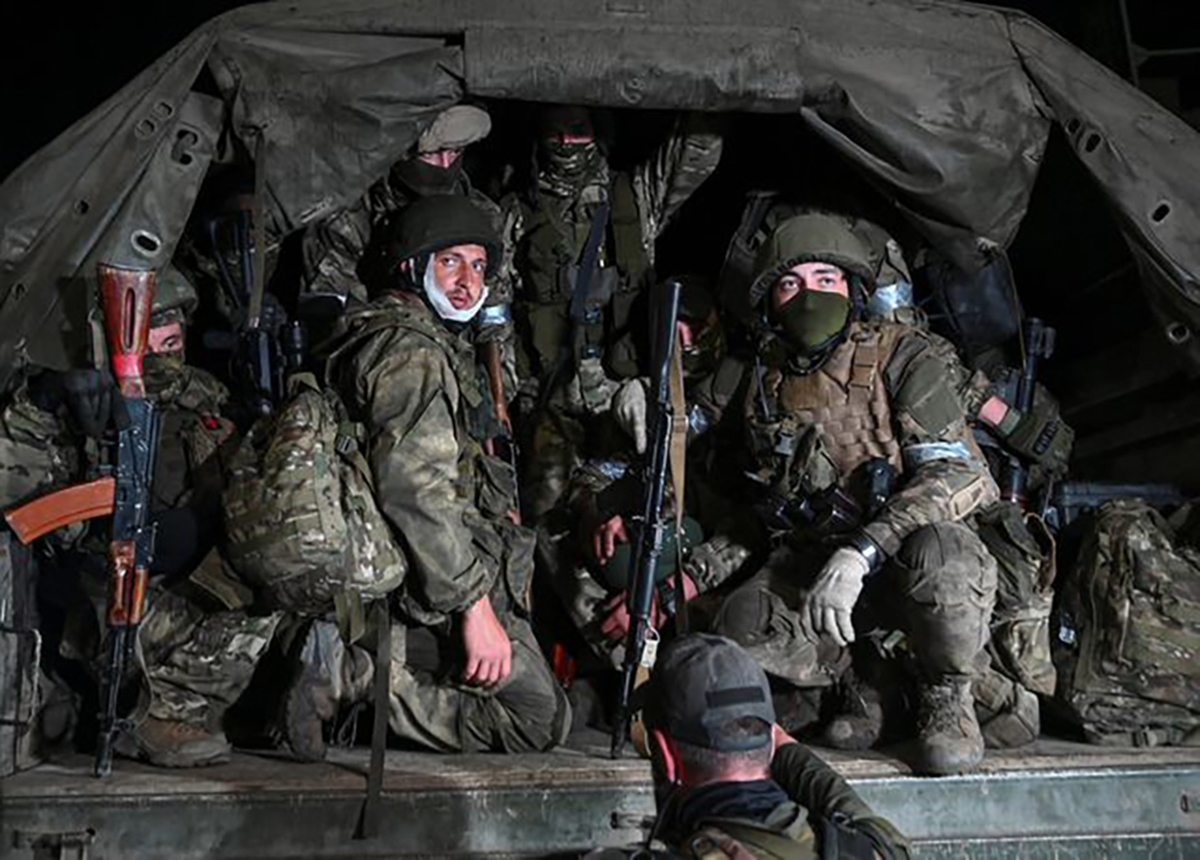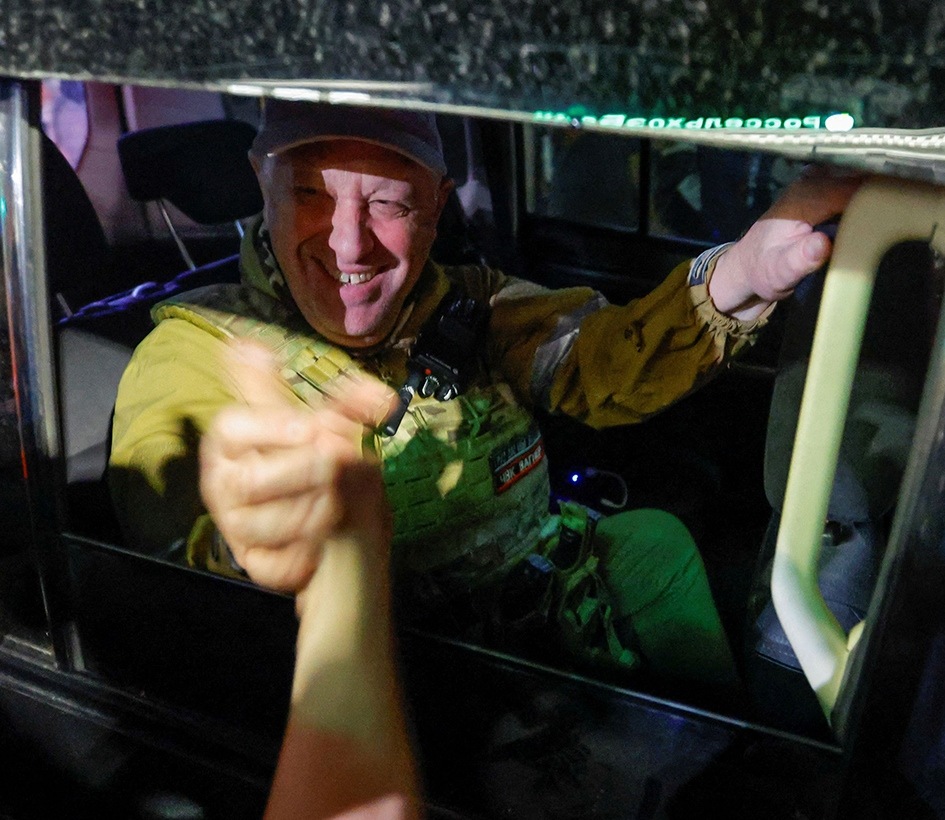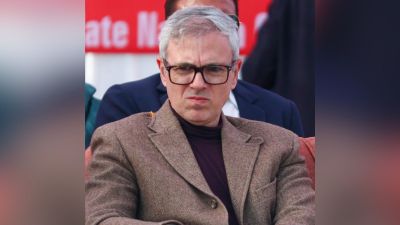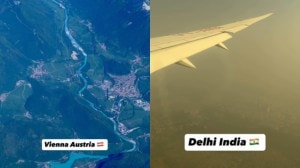Expert Explains | The fallout of Wagner Group’s rebellion, its impact on Putin and the war
The Wagner Group, under Prigozhin, has proved to be a major asset for Putin in the ongoing Russia-Ukraine war. How does Prigozhin’s rebellion change things? How will it impact the war, Putin’s image?
 Yevgeny Prigozhin, one time Putin loyalist, on Saturday, posed one of the biggest challenges that Putin has ever faced. (Photo: REUTERS/Yulia Morozova/File Photo)
Yevgeny Prigozhin, one time Putin loyalist, on Saturday, posed one of the biggest challenges that Putin has ever faced. (Photo: REUTERS/Yulia Morozova/File Photo) Saturday saw dramatic developments in Russia, with the mercenary Wagner group capturing the city of Rostov-on-Don and marching towards Moscow. The troops retreated only after Belarusian President Alexander Lukashenko, an ally of Vladimir Putin, negotiated a deal with their commander Yevgeny Prigozhin. Amid a rapidly changing situation, Nandan Unnikrishnan, a Distinguished Fellow at Observer Research Foundation, New Delhi, explains the developments of June 24.
Yevgeny Prigozhin, the leader of the Wagner group, owes his success to Putin. Why has he now turned against his benefactor?
The Wagner group under Prigozhin has benefited Russia significantly in the ongoing war against Ukraine. It was this mercenary group that captured the key regions of Soledar and Bakhmut for Russia. Because of the Wagners’ military contributions, Prigozhin enjoys some popularity and influence.
 Wagner group troops and their chief Prigozhin pull out of Southern Military District headquarters in Rostov-on-Don Saturday. (Reuters)
Wagner group troops and their chief Prigozhin pull out of Southern Military District headquarters in Rostov-on-Don Saturday. (Reuters)
Prigozhin was trying to resist moves by the defence ministry to bring all private military companies under their control. He has had a long-standing grouse with Russia’s defence minister Sergei Shoigu and the Armed Forces Chief of Staff Valery Gerasimov. In Ukraine, it essentially boiled down to the fact that he felt they were not conducting the war correctly and he was openly criticising some of their tactics.
Reports suggest that when he discovered the defence ministry was moving towards trying to bring all private military companies under its control, he decided it was time for him to do something. On June 24, when he took over the southern headquarters in Rostov-on-Don, his first demand was that Shoigu and General Gerasimov be handed over to him.
A deal was announced late last night after Lukashenko stepped in. What is this deal, and what exactly happened last night?
At 7 pm Moscow time, the world discovered that the Wagner group had taken control of Rostov-on-Don, or at least so the Wagner group claimed. Prigozhin claimed on video that he was in control of the airport and the functioning of the headquarters. About 10 pm, he said there were some negotiations with some Russian generals at the southern headquarters, in which he made this demand that Shoigu and Gerasimov be handed over to him. Subsequently, he said that if this is not happening, he will go on this “march for justice” to Moscow.
 Wagner group chief Prigozhin. (Reuters)
Wagner group chief Prigozhin. (Reuters)
As he declared this march, Putin came on Russian television and accused Prigozhin of treason. He called it a stab in the back and said that decisive action would be taken, which would essentially mean military action would be taken, against anybody who mutinies.
Prigozhin ignored this and Wagner troops started moving towards Moscow in organised columns. On the way, they also overran the city of Voronezh, which is on the main highway to Moscow. They managed to travel to within 200 kilometres of Moscow, at which point the negotiations with Lukashenko came.
The reason why he reached up to that point without significant resistance seems to be that the leadership in Moscow were hoping to resolve the situation without bloodshed. Prigozhin has a long-standing friendship with the Belarus president. They have known each other for many years. The details of the deal are not public yet, but what has been said by Dmitry Peskov, the spokesperson of the Russian president, and by Prigozhin, is in public domain.
One is that Prigozhin’s troops are going back to the barracks and Prigozhin himself would move to Belarus. Those in the Wagner group who did not participate in the mutiny would be offered contracts with the Russian defence ministry. All the others, keeping in mind their “heroic actions in the war”, would be allowed to go home with no prosecution.
Also, the criminal case instituted against Prigozhin for inciting an insurrection would be withdrawn.
There is no mention of what happened to Prigozhin’s main demands, of changing the defence minister and the Chief of Staff, although the spokesperson said that personnel changes were not part of the negotiation.
So will the Wagner group not be part of the war in Ukraine any more? How will that affect the course of the war?
Only those members of the Wagner group who get a contract with the defence ministry will be able to fight. So yes, the Wagner group in itself won’t be part of the war anymore. In terms of personnel, this may not mean a big setback for Russia. The Russians officially have about 300,000 people deployed in Ukraine, and the absence of 20,000 or 25,000 Wagner men is easily replenishable. However, the difference may be in the intensity of fighting. The Wagners were a major concern for Ukraine, because they were particularly ruthless, diehard and daredevil in their fighting methodology. That element will be missing.
How significantly is this mutiny likely to dent Putin’s image?
Counterintuitively, there is a different theory too, that actually his image has got reinforced, because the Russian people value the fact that Putin as the leader of Russia was able to resolve such a complicated situation without bloodshed. Russian social media showed that when the situation was resolved, there was general rejoicing.
However, this may be short lived. A few months down the line, people are likely to start questioning how Putin, a supposedly in-control leader, allowed such a situation to develop at all.
Various speculations have been afloat about the mutiny. While Prigozhin had been vocally unhappy for a while, was such a rebellion anticipated?
On Russian social media, there are two theories about how this mutiny came about. One is that this was all engineered by Putin himself, because he actually wanted some changes in the defence ministry, maybe even to remove Shoigu and Gerasimov. One of the reasons this theory was floated is that when Prigozhin announced stopping the march, he used the phrase “we are withdrawing to the barracks according to the plan”. This made people reverse-extrapolate that Putin must have been part of the plan.
But there are arguments against this. First, if Putin engineered all this to get rid of Shoigu, it creates the impression that he is weak because he’s performing certain actions under blackmail. If Shoigu is indeed removed now, it will give the impression that Putin was acting under pressure. The second is that as a commanding leader, why would he need a pretext or an excuse to remove his defence minister? Also, the spokesperson, Peskov, has said that Putin’s attitude to Shoigu has not changed.
The second, and the more likely scenario, is that the Russian establishment was aware of Prigozhin and his dissatisfaction, but underestimated the nuisance value of Prigozhin. They could have moved much earlier to stop any such action.
How did New Delhi see these dramatic developments?
New Delhi would have been keeping a close eye and monitoring the event. Through the embassy in Moscow, it would have been receiving reports on the situation on the ground. In Moscow, the situation seems to have been calm, with work going on as usual. So there were no reasons for New Delhi to panic about anything. It was in a wait-and-watch mode.
What does this mean for the Wagner group?
At present, it appears that the Wagner group is disbanded. But it will probably be resurrected under some other guise. It is unclear what happens to the operations of the Wagner group in Syria, Libya, Africa, etc. These operations were in Russia’s interests, so the group will probably be revived in some form, maybe under a new name or a new leader.
But for now, Russia has a headache on its hands, because with the Wagner group gone, there are armed and trained Russians sitting in various parts of the globe, mainly in Africa and the Middle East. The Russian government will have to do something about it.
But then, there is also the fact that Wagner was in individual contracts with the governments of these countries. The armed men were there with the acknowledgement of the local government and the local government had given them specific responsibilities. So now, just pulling them out would create all kinds of problems.
Nandan Unnikrishnan spoke to Yashee



- 01
- 02
- 03
- 04
- 05



































